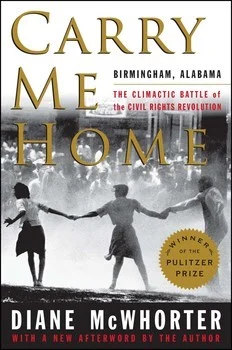Carry Me Home
Spencer has captured the exclusive rights to make an episodic television/SVOD series of Diane McWhorter’s PULITZER PRIZE-winning work of history, investigative journalism and personal memoir—which Time Magazine named one of the top 100 nonfiction books of the century.
From the country club to the black church to the Ku Klux Klan klavern, CARRY ME HOME chronicles the people and events that conspired in the turning-point YEAR OF BIRMINGHAM, 1963: the sensational face-off between Martin Luther King Jr.’s child demonstrators and Commissioner Bull Connor’s police dogs, followed by the bombing of the Sixteenth Street Baptist Church, a white supremacist terrorist act that killed four black Sunday school girls. “These children—unoffending, innocent and beautiful—were the victims of one of the most vicious and tragic crimes ever perpetrated against humanity,” Dr. King said in his eulogy.
Meteor 17 is partnered with *ROOTS producer Mark Wolper (www.wolperorg.com). They plan to produce an ongoing series, in the spirit of ROOTS, that can run multiple seasons, with continuing characters: an African-American community in conflict with itself and white players acting out the strained, veiled collusion between the wealthy upper class into which the author was born and its designated subordinates—politicians, the police and the Klan.
Though CARRY ME HOME builds to the Birmingham church bombing, the book (and our series) goes back deep into the “old” world of Jim Crow and enforced segregation, to trace the way white supremacy captured the soul of this industrial southern town. And the whirlwind Birmingham reaped was democracy in action. The series will reimagine the race-relations milieu familiar to audiences of recent Civil Rights-themed projects—as MAD MEN recast the cultural upheavals of 1960s—with searing subtlety.
The book’s author, Diane McWhorter, is a white woman whose father took part in clandestine racist activities. The book serves as a vehicle for her to grapple with her family’s culpability in the historic racial injustice of the times. Intercutting between the prime of the civil rights era and the Jim Crow South that incubated this social revolution, our series will draw lines between these time periods and between the various factions of Birmingham, Alabama. A militant African-American minister in competition with Martin Luther King as well as with the black bourgeoisie. The African-American staff at the country club. The wealthy white industrialists who are the club’s members. The law. The press. The “footsoldiers” for racial separation—the KKK and its neo-Nazi offshoots. Outsiders and “agitators” from liberal college kids to national Movement figures to the FBI. Rich characters representing all these factions will drive CARRY ME HOME toward its cataclysmic conclusion.
CARRY ME HOME MOMENTS:
Spencer produced eight, two minute excerpts from the book, selected by Diane McWhorter, via moving audio readings by Evangelist Leon Issac Kennedy.
In conjunction with Brother Steve Harris and his organization, the readings will be heard on 104 radio stations in top markets across America during the month of April, 2018. This will happen in honor of and in conjunction with tributes to Dr. King. April, 2018 marks the 50th anniversary of the shooting which took his life.
Proffer, Harris and McWhorter also plan to share these readings with schools across America to further enlighten and educate on the birth of the civil rights movement in Birmingham, which is at the heart of Carry Me Home.
* ROOTS: Rotten Tomatoes (98%): https://www.rottentomatoes.com/tv/roots/s01/
Awards: http://www.imdb.com/title/tt3315386/awards
https://www.amazon.com/dp/B000FBJGS6/ref=dp-kindle-redirect?_encoding=UTF8&btkr=1
Carry Me Home’s first Epilogue:
Like the tragedy in Dallas that same fall, the Sixteenth Street Baptist Church bombing had ceased to feel like a murder case and had become a piece of the culture, abstract yet powerful and permanent, as haunting as the work John Coltrane recorded two months after the crime. “Alabama” is “a frightening emotional portrait of some place, in these musicians’ feelings,” wrote the playwright LeRoi Jones (Amiri Baraka). “If that ‘real’ Alabama was the catalyst, more power to it, and may it be this beautiful, even in its destruction.”
NYT Book Review: http://www.nytimes.com/books/01/03/18/reviews/010318.18shiplet.html
Time Magazine: Top 100 of the Century:
http://ew.com/article/2001/05/02/carry-me-home/
https://www.kirkusreviews.com/book-reviews/diane-mcwhorter/carry-me-home/

